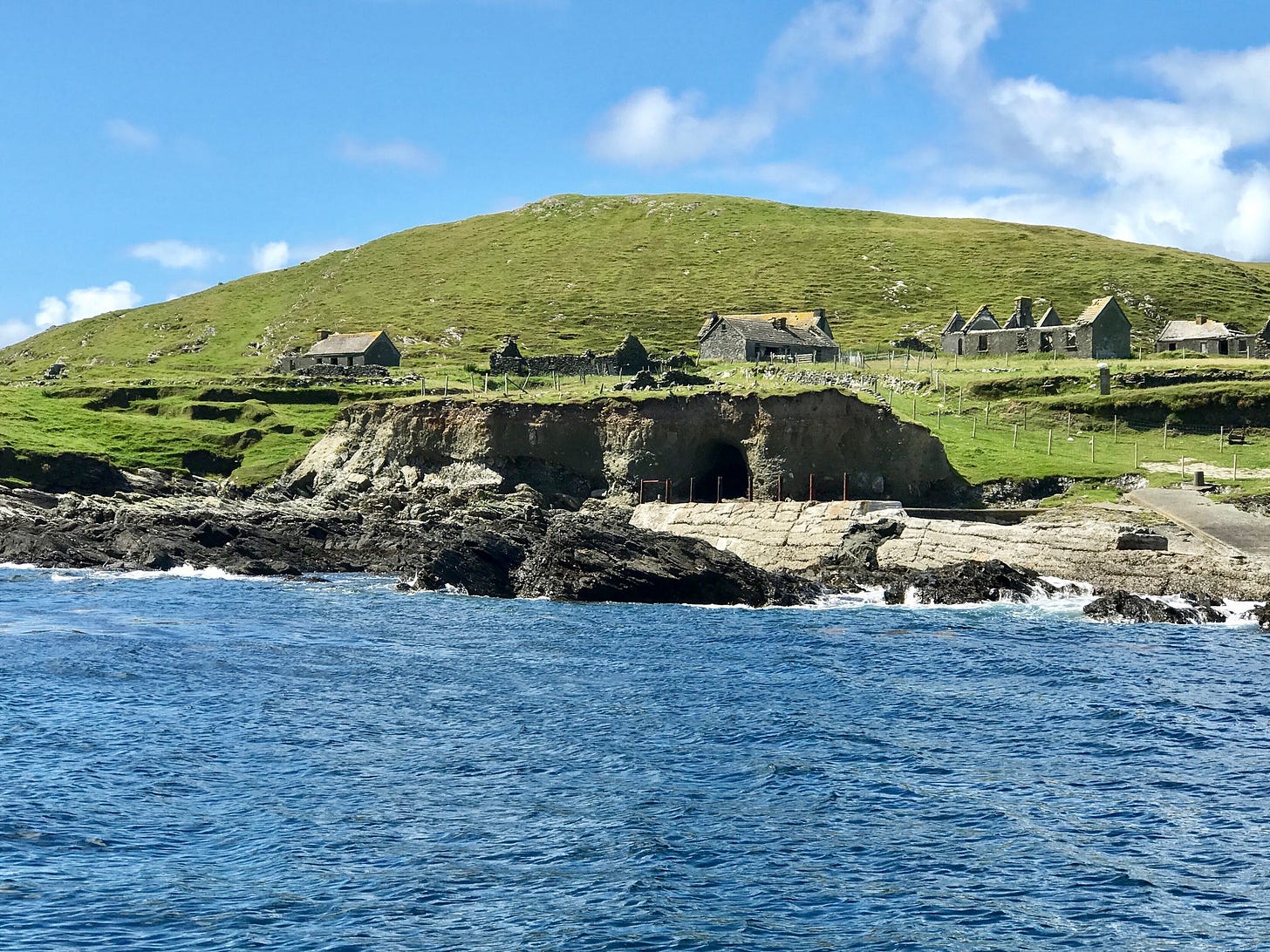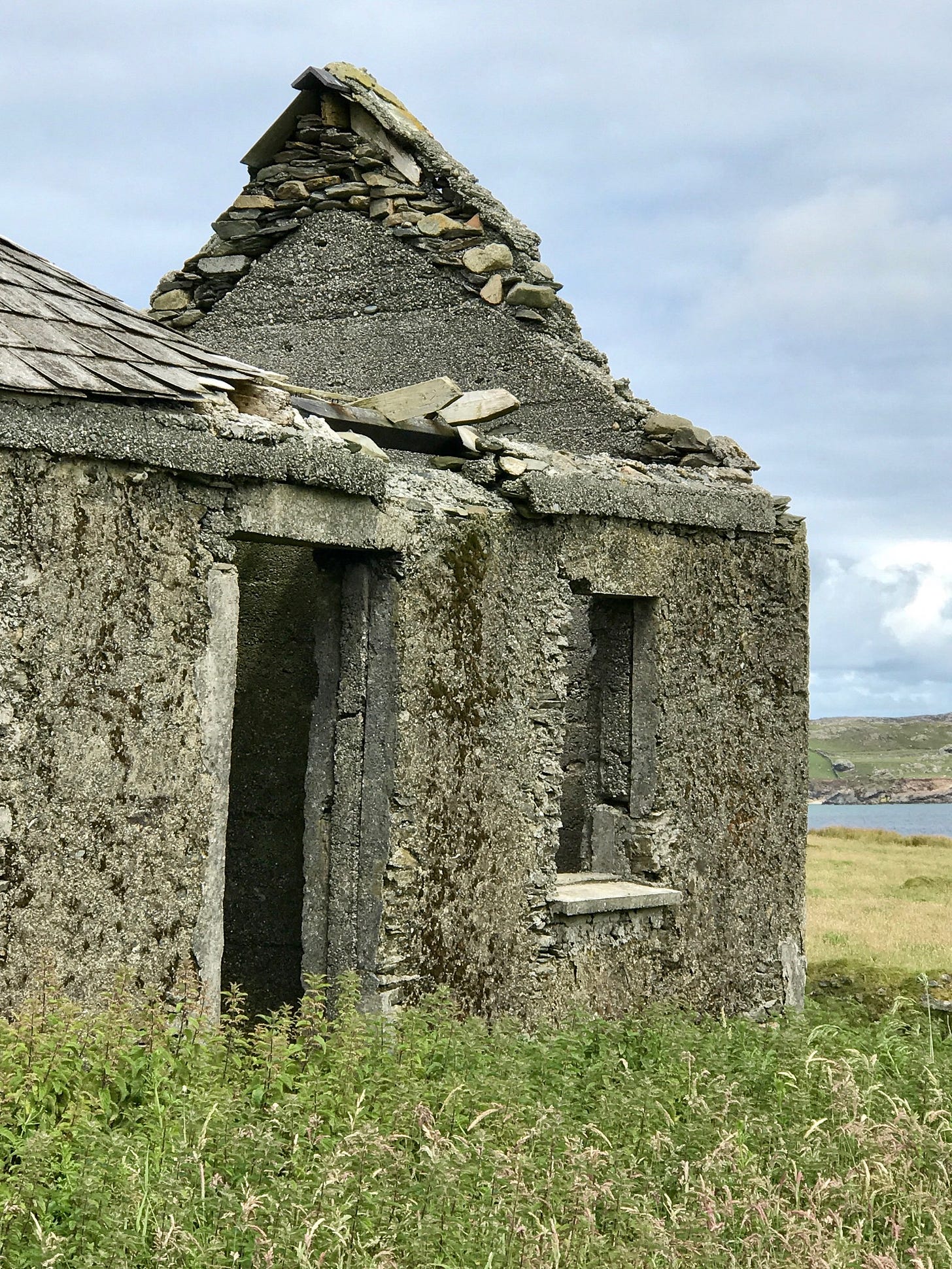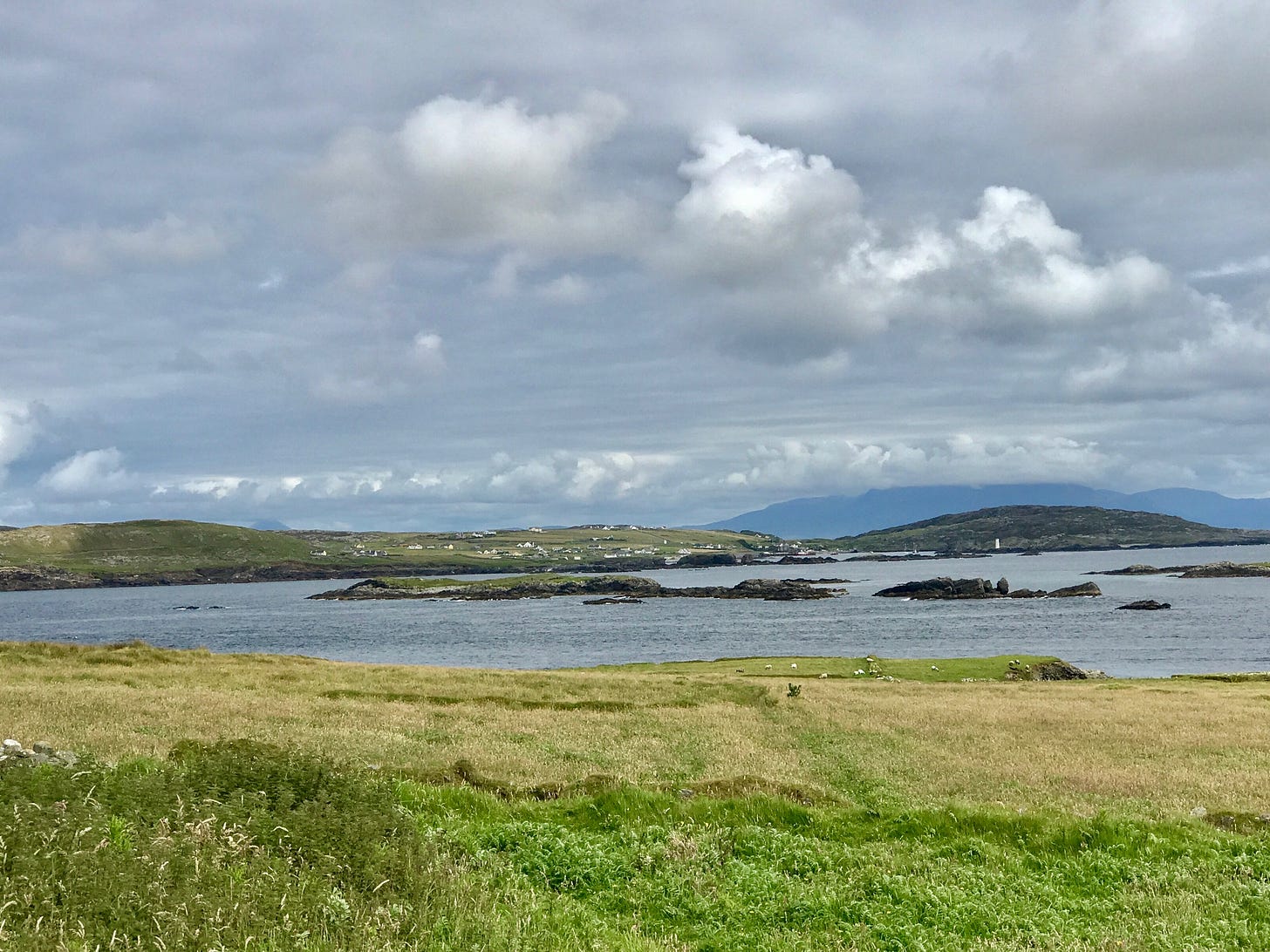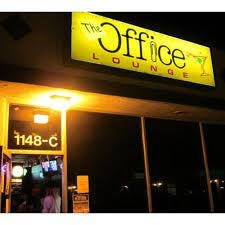My cousin Gerry, the gravedigger, was a direct descendant of the King of Inishshark, or in Irish Inis Airc. Tradition says that the now deserted island was named after an ancient king named Erc, so Gerry comes from a long and powerful line.
“Oh, Shark has a beautiful graveyard all right, right on the sea,” Gerry once told me. “But not much of a harbor.”
Inishshark, with many Bronze Age burial sites and mounds, is an isolated spot in the Atlantic Ocean off the west coast of Ireland. It lies just west of Inishbofin and nine miles from Cleggan, the nearest port on the mainland. Inishshark is now uninhabited. Until 1960, it had a population of less than 200 people in a fishing and farming community with twelve houses and St. Leo’s Church--named after the island’s patron saint who lived there sometime between the sixth and eighth centuries.
I pulled up to Inishshark in a small hired boat, then scaled the wall, my feet digging in, trying to find a foothold in the rock, and finally pulling myself up on land. In the old days, to leave this harbor, the Shark fisherman had to lower their currachs, or canoes, down into the ocean water with a winch. No large boat could even approach the treacherous harbor.
The graveyard jutted out at the edge of the sea, the tombstones, rarely attended, leaning into the wind with undecorated stoicism. But the ruins of the empty houses in the village seemed more of a monument to the lost life on Inishshark. The door wide open, I entered one of the cottages and found layers of damp mold and dust covering all that had been left behind—a chair, a table, a few last dishes in the cupboard. Birds had nested in the rafters, their droppings covering the floor below. The cottage walls seemed to have lost their strength, and with one last breath, might collapse any moment. The island had been left to the corncrakes and other wild creatures who now had taken refuge there.
The abandoned houses seemed eerily like some of those I knew in Iowa, small villages and towns hit by the Farm Crisis in the 1980s. At that time, farms foreclosed at a rapid rate when the U.S. government enacted a planned consolidation of family holdings. Farmers were told to move to cities and find work in factories. Small businesses in small towns closed their doors and boarded up their windows never to reopen again. Old general stores and schools in the countryside rotted and caved in on themselves.
In these days when we admire people who can live off grid, I realized Inishshark never had a grid. There was no electricity, running water, no telephone, no regular newspapers or mail deliveries. On Sundays, the men lowered their currachs into the water, then the islanders climbed down into the canoes to row to Inishbofin for Mass at St. Colman’s Church. Afterward, they got their mail at the post office, gathered up some groceries, and headed to the pub for a pint. In good weather, they played a game of football, or soccer, on the field kept clipped by sheep.
The Inishshark islanders hung on for centuries, not without incident. In an emergency, they built a huge bonfire, hoping that someone from Inishbofin would see it and send help. Throughout the years, the government threatened to move the islanders off of Shark, claiming the remote place unsafe. The old-timers fiercely resisted the idea. The younger people were more open, often yearning for a chance to further their educations or broaden their opportunities.
So, for decades many young people emigrated, the population declining, while their parents and grandparents maintained the local traditions, living out their old age on the island. They planted and dug potatoes in lazy beds. They caught mackerel and sold them at the Clifden market.
Yet the sea posed a great danger, taking the lives of fishermen, some never to be seen again. Thomas Lacey lost three sons to the sea. The body of one son washed up on the shore, the other two disappeared into the oblivion of the waves. Tom thought that their spirits were destined to circle forever around his cottage.
He refused to go to the mainland when on October 20, 1960, the government forced the islanders to evacuate. In 1959, an islander had died of an appendicitis, waiting three days for help. That was the end for the government. They constructed some houses on the mainland near Claddaghduff and ordered Inishshark emptied.
Out of their cottages came the islanders, carrying bedsteads on their backs, carrying chairs, cups and saucers, teapots, pans, skillets, hens in baskets, geese in sacks, a stack of hay, straw brooms, and string-tied suitcases, a dark brown cat in a blackened cooking pot with the lid half tied down, rakes and scythes, calves tied to the currach to swim to their new home, the little collie dog, at the stern.
But Thomas Lacey remained in his cottage.
“You all go,” he said. “I’ll stay here.”
The priest tried to get him to change his mind. “Look, Thomas, you can’t stay on by yourself all alone.”
Tom watched the other 23 islanders push off in their currachs to be settled in their new homes near Claddaghduff. There, he knew they would complain that they were plopped down on nothing but rock, that they had no soil for potatoes, that they couldn’t grow a thing, that the fishing was no good. They would sit inside those new houses and make fishing nets, never to use them. At night, they would walk the road, up and down and around the peninsula, singing their sea shanties.
“They were Shark men,” my cousin Gerry told me.
And once a Shark man, you never sing any other tune.
Then in his cottage on Inishshark, Tom built a fire, set the table for three places, left the door open, and walked the low road, hoping his two sons would come back to him in some shape or form. He walked and he sang.
But he never saw a sign of his two sons.
He walked back to his cottage and ate alone.
The next morning the priest came back from the mainland to try one more time to persuade Thomas to join them.
“My sons came to me in the night,” Thomas told the priest. They were no longer hovering around lost at sea but at peace with God.
The priest knew that Thomas himself had found a safe harbor at last.
Then Thomas put out the fire, closed the door, and walked down to the sea.
The Office Lounge!
A special treat! Join the Iowa Writers Collaborative for a Zoom discussion of the issues of the day. Noon. CDT. October 5.
https://us02web.zoom.us/j/87436866057#success
Join me and my talented colleagues.









Thoughtful and thought provoking especially when one can see their own ancestors in this story. Thank you, Mary.
Heartbreakingly beautiful! I would love to visit this sacred spot. Thank you for sharing Inishshark with us!